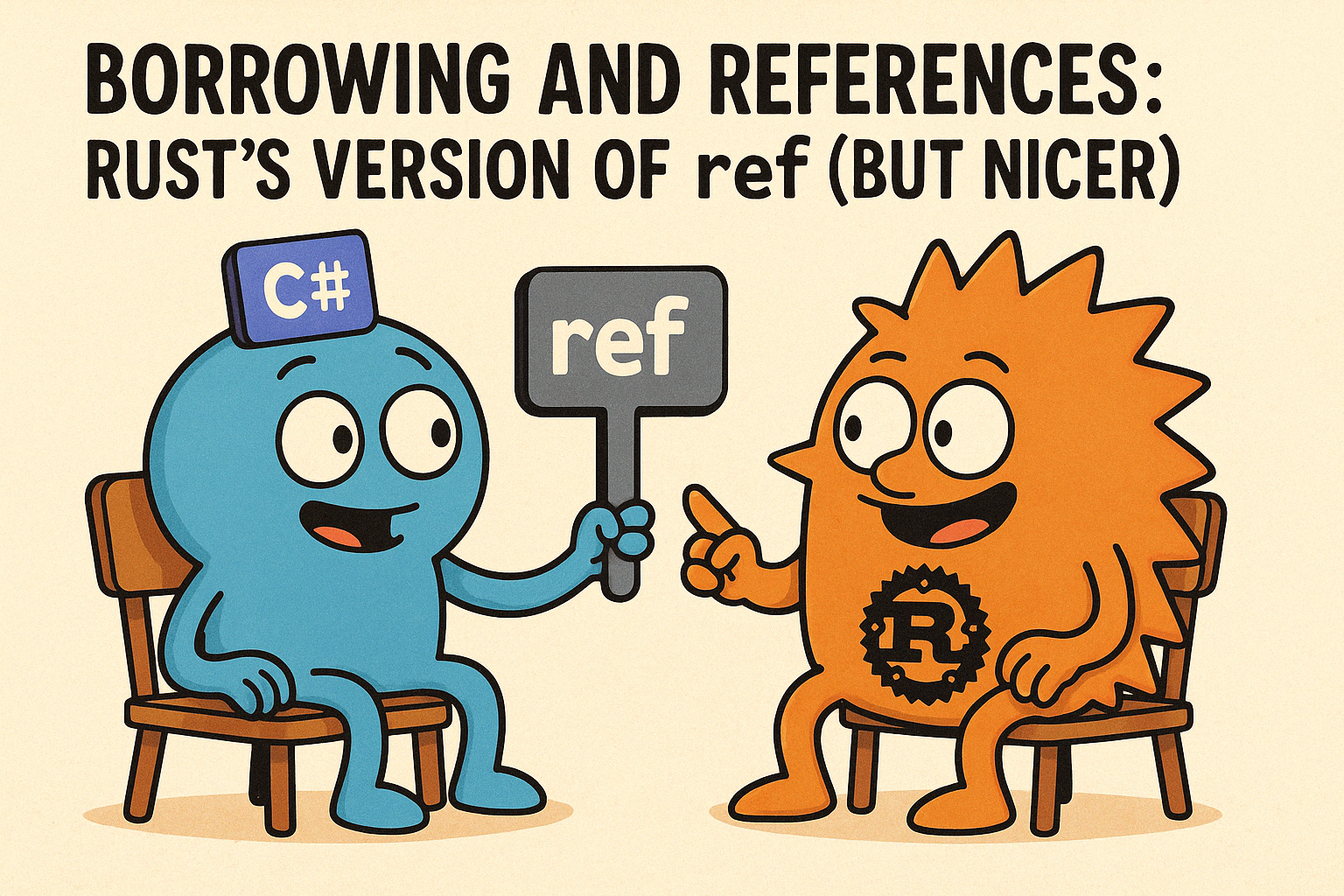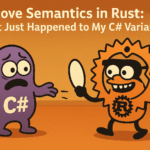
Borrowing and References: Rust’s Version of ref (But Nicer)
- Chris Woodruff
- April 20, 2025
- Rust
- .NET, C#, dotnet, programming, rust
- 1 Comment
If you’ve been writing C# for a while, you’ve likely crossed paths with ref, in, and out parameters. They allow you to pass variables by reference, enabling a method to read or modify the original value.
Useful? Definitely.
Safe? Uh… sometimes.
In Rust, there’s a similar concept called borrowing. It uses & and &mut, and it feels a lot like passing ref or in in C#, but with one significant difference:
The compiler enforces safety rules that make data races and invalid access impossible.
Today, we’re diving into borrowing, references, and how Rust holds your hand (and your memory) without letting you write foot-gun code.
C# Refresher: Passing by Reference
In C#, you might pass by reference like this:
void Double(ref int x) {
x *= 2;
}
int value = 10;
Double(ref value);
Console.WriteLine(value); // 20
This works, but you’re on the honor system. You could accidentally mutate something you didn’t mean to. There’s nothing stopping you from sharing that ref with another thread or keeping it alive too long.
Rust doesn’t leave this to chance.
Rust’s Version: Borrowing with &
Let’s start with borrowing in read-only mode:
fn main() {
let name = String::from("Alice");
greet(&name);
println!("{}", name); // Still valid!
}
fn greet(person: &String) {
println!("Hello, {}!", person);
}
Here, &name means “borrow name temporarily.” The greet function doesn’t take ownership; it just gets a reference to the data.
Rust tracks this at compile time. When greet is done, the borrow ends, and name is still fully usable.
Want to Mutate? Use &mut
Just like C#’s ref, Rust lets you mutably borrow a value using &mut but it’s even stricter.
fn main() {
let mut count = 5;
double(&mut count);
println!("Doubled: {}", count);
}
fn double(num: &mut i32) {
*num *= 2;
}
Notes:
- You need to declare the original variable as
mut. - You borrow it mutably with
&mut. - Inside
double, you dereference it with*num.
And the best part? Rust won’t let you have more than one mutable reference at a time. You either get:
- Many immutable references
or - One mutable reference
Not both.
This avoids the classic threading issues and memory races that C# devs have to tiptoe around with locks or volatile.
The Borrow Checker: Annoying but Trustworthy
Here’s where Rust gets strict. Try doing this:
let mut count = 10; let r1 = &mut count; let r2 = &mut count; // ERROR!
Rust won’t allow it. Why? Because you’re trying to create two mutable references to the same data at the same time.
Even if r1 and r2 exist in separate lines, Rust sees the overlapping lifetimes and panics at compile time. No runtime surprises. No corrupted memory. No segfaults.
It feels annoying at first, but it’s the kind of frustration that saves you from hours of debugging later.
Lifetime of a Reference? Compiler’s Got It Covered
You don’t have to manually manage memory like in C++. Rust figures out the lifetime of each reference for you in most cases. It ensures that your borrowed data never outlives the thing it points to.
This means:
fn main() {
let r;
{
let x = 5;
r = &x; // ERROR: x doesn’t live long enough
}
println!("{}", r);
}
This won’t compile because x gets dropped when the inner scope ends. Rust refuses to let you create a dangling reference. C# would happily let you hold a reference to a deallocated object (until the GC saves you… or doesn’t).
TL;DR: Borrowing Is Like ref, But With Rules
Here’s the cheat sheet:
| Concept | C# | Rust |
|---|---|---|
| Pass by ref | ref, in, out | &, &mut |
| Dereference | Implicit (x) | Explicit (*x) |
| Safety | Runtime GC, trust system | Compile-time rules |
| Thread-safe? | Not guaranteed | Guaranteed |
Final Thoughts
Borrowing in Rust might feel heavy-handed at first, but it’s actually freeing.
It frees you from GC pauses. It frees you from race conditions. It frees you from wondering, “Can I still use this?”
And it all happens before your code even runs.
Tomorrow we tackle the ultimate tough-love teacher: the Borrow Checker itself. You’ll probably hate it a little, but eventually, you’ll realize it’s the mentor you never knew you needed.






MV10
The C# equivalent to your borrow scope example would not be a “dangling reference”. This is 100% valid and safe because r is a copy of the same reference. It doesn’t matter if x goes out of scope, the GC will see that the boxed integer is still rooted.
object r;
{
object x = (Int32) 5;
r = x;
}
Console.WriteLine(r);